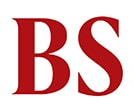Page 64 - Wall Street
Record highs for Wall Street quarter send other stocks higher
Stocks are benefitting from a belief that Trump spending policies will spur growth
Wall Street slips, led by health care decline
The health index pared its post-election lift but was still 1.8% higher than November 8, even after Friday's drop of 1.2%
Wall Street slips, led by healthcare decline
Wall Street equities took a breather after rising dramatically since Donald Trump's surprise victory in the presidential election
Wall Street slips; indexes still near record highs
Nasdaq hit a record high earlier in the session, helped by a rise in Microsoft and other big tech stocks
Wall Street lower at the open after post-election rally
Trump's plans to cut taxes and raise infrastructure spending would boost economic activity
Wall Street swings in post-U.S. election rollercoaster
The Dow Jones industrial average was down 25.55 points, or 0.14%
US election, rate uncertainty rattle Wall Street
The S&P 500 lost 14.43 points, or 0.68%, to 2,111.72, its biggest single-day percentage drop since Oct 11
Wall Street falls as FBI to review more Clinton emails
Each of the three major indexes on Wall Street fell to session lows, with the S&P 500 dropping 1 per cent in an hour
Wall Street broker-dealer profits in 2016 to exceed last year's: Watchdog
The securities industry in New York City has shrunk since the financial crisis of 2007-2008
Stocks dip as earnings pour in, consumer discretionary lags
S&P 500 companies largely exceed analysts' estimates for the third quarter so far
Apple weighs on Wall Street; oil, gold prices slip
Boeing's quarterly performance saves the Dow Industrials
S&P hits two-week high on strong earnings; M&A supports
Flurry of acquisitions indicate corporate America continues to see untapped value in the market
Regulators taking another look at costs of Wall Street safety rule
Just as memories of the financial crisis are fading and tough new banking regulations are beginning to bite, some current and former regulators wonder whether one of the rules is too much of a burden for markets and taxpayers.At issue is the requirement that the largest US banks set aside $6 of capital for every $100 of assets on their books - double what they had to hold before. Because this so-called Supplementary Leverage Ratio (SLR) rule applies to all bank assets including Treasuries, it has made owning that ultra-safe government debt and related trades more expensive.Wall Street has complained about costs of many measures designed to make the financial system safer, but regulators have been firm.However, when banks argue that the SLR, which came into force early last year, unnecessarily burdens short-term financing, current and former officials say they may have a point. "It has turned out to be quantitatively more of a problem than some people had anticipated," said Jeremy Stein
US stocks touches two-week high on deals, strong earnings
AT&T was down 1.2 percent at $37.03 after the telecommunications company said it would buy Time Warner Inc for $85.4 billion
Wall Street ends little changed; Microsoft hits record
A stronger dollar, which touched its highest level since early February, also pulled on sentiment as it could dent the earnings of large multinationals
Wall Street drops on bleak GE outlook; Microsoft blunts losses
Helping curtail the losses were Microsoft and McDonald's, both of which reported strong quarterly results
Wall Street dips as telecoms slump; AmEx surges
Sharp drop in telecoms is offset by gains in healthcare
Wall Street dragged down by healthcare stocks
S&P 500 healthcare sector dropped 0.71% as Illumina's disappointing results weighed
Wall Street: Earnings season begins as White House race heats up
Earnings could move the bar for stocks more than anything else, especially because of their higher than average valuations
Wall Street slips after September jobs report
US employment growth slowed for the third straight month in September, with employers adding 156,000 jobs
